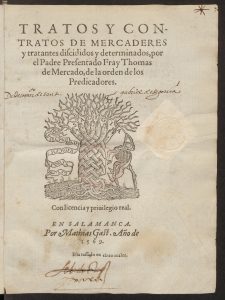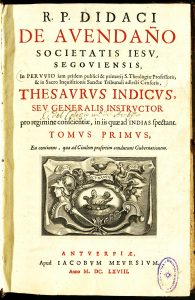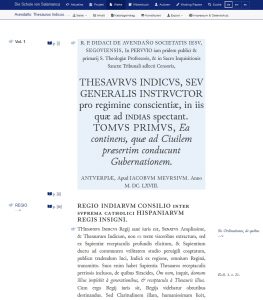Diego de Avendaño (1594-1688) was born in Segovia. During his studies in Seville, he met Juan de Solórzano Pereira and accompanied him to the New World. Avendaño continued his studies in Lima at the Colegio San Martín of the Jesuits, joined the order himself and taught and led the Jesuitic colleges and universities in Cuzco, Charcas and Lima in the following decades. After, as he himself said, “almost fifty years in Peru” he published his main work, the six-volume Thesaurus Indicus, in which he discusses a wealth of questions of secular administration and spiritual practice. All six volumes will appear successively in the Digital Collection of Sources of the project “The School of Salamanca”. A start has now been made with the first volume devoted to the questions of the secular regiment of Peru in the 16th and early 17th centuries.
Month: September 2019
José Luis Egío: The Emergence of Scholastic Probabilism in a Global Perspective
In the last session of the Salamanca colloquium, José Luis Egío drew on his in-depth knowledge of the sources acquired by the intense editorial work done in the project and traced some roots of scholastic probabilism in the 16th century.
The history of probabilism has been the subject of important recent publications on scholastic legal and theological thought (Tutino, OUP, 2018; Schüssler, Brill, 2019). Nevertheless, the contribution of the specific historical context and global dimension of the early modern period’s enormous political, religious and economic changes to the emergence of probabilism has usually been underestimated and has received little attention. However, by exploring the missionary and mercantile fields and the writings of members of the School of Salamanca such as Francisco de Vitoria, Tomás de Mercado and Alonso de la Vera Cruz, José Luis Egío showed how the increasing use of probable argumentation was one of the many strategies employed by jurists and theologians to accommodate or translate the normative framework of European theology and canon law to new and unforeseen contexts and to try to answer new dubia.

